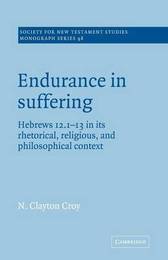
|
Endurance in Suffering: Hebrews 12:1-13 in its Rhetorical, Religious, and Philosophical Context
Paperback / softback
Main Details
| Title |
Endurance in Suffering: Hebrews 12:1-13 in its Rhetorical, Religious, and Philosophical Context
|
| Authors and Contributors |
By (author) N. Clayton Croy
|
| Series | Society for New Testament Studies Monograph Series |
|---|
| Physical Properties |
| Format:Paperback / softback | | Pages:264 | | Dimensions(mm): Height 217,Width 140 |
|
| ISBN/Barcode |
9780521018913
|
| Classifications | Dewey:227.8706 |
|---|
| Audience | | Professional & Vocational | |
|---|
| Illustrations |
Worked examples or Exercises
|
|
Publishing Details |
| Publisher |
Cambridge University Press
|
| Imprint |
Cambridge University Press
|
| Publication Date |
22 August 2005 |
| Publication Country |
United Kingdom
|
Description
Hebrews 12: 1-13 portrays the suffering of the community to which it is addressed by means of two images: an athletic contest, and God's fatherly discipline. N. Clayton Croy provides a thorough exploration of the theme of suffering in the Jewish and Graeco-Roman traditions, and surveys the different interpretations of this passage which have been offered by Christian writers over the centuries. He argues that the concept of 'training' unites the passage, which presents Jesus as the supreme athlete, an agonistic exemplar for those running the race. These verses also support a non-punitive understanding of discipline, in which God's children undergo a positive process of education. The educative notion of paideia combines with images of athletic training to establish a call to faithful endurance rather than repentance.
Reviews"...a careful and sound analysis...about the meaning and purpose of suffering. This work is a model dissertation in its formulation of the question, its critical interaction with the history of interpretation, its detailed examination of both the Greco-Roman and Jewish backgrounds informing a New Testament text, its methodological rigor, and its commitment to bring the fruits of exegetical work to bear on theological and pastoral applications of the text. It will become necessary reading for all future interpretations of Heb 12:1-13." Ashland Theological Journal
|